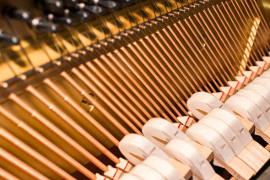In my most recent post, I talked about FEAR and how to combat it. All of the strategies that I mentioned in that article involved doing something. There was action involved. That struck me today as I was driving in the car on my way to an event. In order to combat fear, you have to take action.
In the case of playing an instrument, you have to take action. It’s like being hungry. In order to get past your hunger, you have to use your mouth and hands to put the food in your mouth. You HAVE To take action. You will never be able to play unless you make the effort. This goes for anything that you’re trying to do, but this is a blog about music so I’ll be making the obvious references to music. 🙂
One of the things that I’ve found helps me focus on the action steps I have to take is to write down what I want to accomplish. This helps in that you have to focus on what you want to accomplish. Write your goal on post it notes and place them in obvious and not so obvious places –
- The steering wheel of the car,
- Your computer keyboard at work,
- Your bathroom mirror
- The edge of your computer monitor at work
- Inside your wallet
- On the Back of Your Smartphone
Now that you’ve written it down, it is time to pick up your instrument and continue to Play It By Ear






